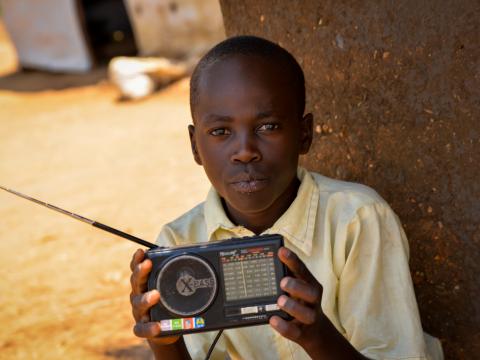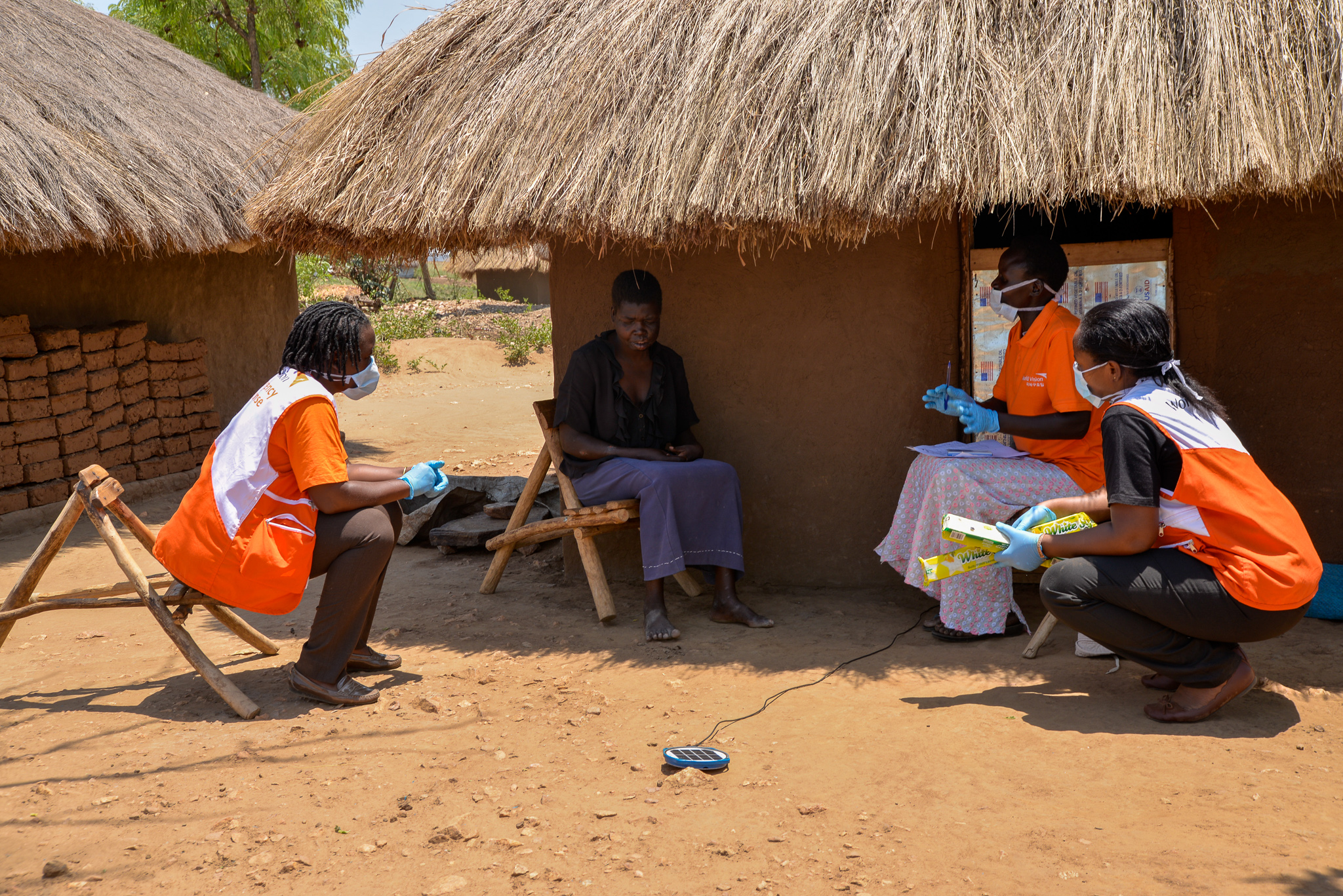COVID-19: Coping with a lockdown in a refugee settlement

By Aggrey Nyondwa Kikobera, Communications Official, World Vision Uganda
Outside her grass thatched hut, Jessica sits, lost in thought. Beside her is Daniel, one of her seven children, reading his science textbook.
Omugo village is unusually quiet.
In another part of the compound, the other children are idling about, except for nine-year-old Samuel who is isolated under a shade, enjoying music on his old radio. He turns the knob, nodding to the rhythms of the music. He attracts the attention of his younger siblings, being that he is the only one doing "something interesting". They also begin to nod to the music.
“They are here all the time, they cannot go to school anymore and they can’t go out to play with the others (children) either. They run around the compound, dance sometimes, and when they are tired, they sleep,” Jessica says.
Jessica "felt a sickness" when she heard that there was a new disease outbreak in the world and that it had come to Uganda. She was seated almost in the same spot outside her hut, when she heard-on Samuel’s radio that the country was to go under lockdown with limited movements, trade and other activities.
“When I heard about Coronavirus, I even felt sick right away because I looked at my children and the situation we were already in and imagined how we would survive it. We ran from South Sudan for survival but with such a disease and all its implications, survival will not be easy, not even here in Uganda,” says a visibly-worried Jessica.
Jessica had earlier been advised by her friend to buy a book for her first-born, Daniel, so he could catch up with everyone else in class. When schools closed, the book came in handy.
“My mother bought for me this book a while ago. I now read from home because at school they told us there is a new disease called Coronavirus and it kills people. We were encouraged to continue reading at home so that we don’t forget what we studied,” says Daniel.
He only reads during day because at night the light is not enough. Daniel wants to be a doctor and fight such “diseases like Corona that kill people.”
Just like Jessica and her children, over 1.3 million people in refugee settlements are faced with some of the biggest fears of their lives. After fleeing their countries for survival, they now have to face an outbreak knocking at their door – one that has killed over 200,000 people worldwide.

In March, World Vision warned that the mortality rates for COVID-19 could be unprecedented in vulnerable communities and fragile contexts like refugee settlements. The organisation asked that countries hosting high numbers of refugees be given special and urgent support because the impact the pandemic could have on these countries would be far greater than what we have seen to date in more medically-advanced countries, both directly through COVID-19 deaths and indirectly through the reduction of life-saving child health services as countries focus on this new disease.
Risk for children
According to UNHCR, 53,000 refugee children have been identified as at risk or unaccompanied or separated. The majority of these are psychosocially disturbed by the realities of war and having no parents. Such children benefit a lot from play and psychosocial services that are offered at the various Child Friendly Spaces in the settlements. Child Friendly Spaces are facilities where children freely access play items and interact with other children, attend Early Childhood Development (ECD) and through caregivers, receive psychosocial support. Over 30,000 children access these facilities regularly. Following the directive to close schools, these facilities were closed as well.
Most of the unaccompanied and separated children are fostered in homes where foster parents, supported by aid agencies look after them as their own. With the increased fear and tension, the foster care programme faces a big challenge.
“The disease might not kill as many children from the available statistics but the impact to them is great. In our foster programme, we train and facilitate foster parents to take care of these vulnerable children. This is now difficult because everyone is scared and they only want to take care of their own, without any extra responsibility,” says Brenda Madrara, a Project Manager at World Vision.
“This push back from the parents is majorly because of the increased pressure on livelihoods and basic needs including food, but also the fear of bringing someone that might be infected,” adds Brenda.
Children mostly stay with their grandmothers as their care-givers. According to a research conducted by Lancet Infectious Diseases, the COVID-19 mortality rate for people between 60-69 is 3.6% and this is about the average age of many grandmothers and caretakers in the settlement. In the absence of these guardians due to death or hospitalisation, thousands of refugee children would lack basic care.

Business and livelihood
Almost all the markets in the settlement are run by refugees, thanks to Uganda’s accommodative refugee policy, which allows refugees to move freely and even take part in businesses, trade and farming. A number of these markets have been closed except for those that sell food and other essential products.
Paibe works in a market in Omugo Refugee Settlement, but since the announcement of the restriction measures, customers have reduced and her business is on the verge of collapse.
“I operate a small business at the market but currently things are hard. We used to buy merchandise at Kobala, but movement is not allowed now, so we have to buy from around which reduces the profit. People are not there in the market, there is no business at all. Survival is now hard because I have to buy soap and sauce for the children,” Paibe says.
At the beginning of April 2020, the World Food Programme (WFP) announced a 30% reduction on food rations for all refugees, worsening the situation. Refugees would sell part of this food to buy soap, or an alternative sauce or get some money to grind the maize grains given into flour.
Jessica’s husband is in South Sudan where he usually goes to dig and cross back with some cassava which supplements the food ration for the family, and also bring in some money. He is now stuck in Sudan and cannot cross back to support them.
“My husband would help us a lot. From the food he would bring, we would eat some and sell the rest to get some money. When they closed borders because of Coronavirus, he was still in South Sudan and he cannot come back now. I now have to fend for my children single handedly,” Jessica says.
Peter Aringu, the chairperson of the South Sudanese Refugees Association, says they have always viewed Uganda as their second home although they are faced with land challenges to avert hunger.
“Refugees are already vulnerable and lack land for cultivation. Besides land, we are financially incapacitated and cannot travel up to food distribution centres to get the food relief supplied by WFP because they are very far. The elderly and pregnant mothers are majorly affected,” he says.
The Office of the Prime Minister is now working with World Vision to respond to the urgent needs in the settlement including soap (bar and liquid soap), hand washing facilities and personal protective equipment for health workers.
“We have engaged our partners like World Vision, and we have so far received soap for the households and other hygiene equipment for the health centres. We are making sure that refugees still access all the services entitled to them including food, water and health care. We do all these while observing the set government guidelines on social distancing,” says Nicholas Tayeebwa, the Assistant Settlement Commandant, Omugo Refugee Settlement.

Awareness and risk communication
Refugee communities still lack the basics in the fight against the spread of the Coronavirus, especially information. With limited access to radio, television, newspapers, the internet and the impediment of language barrier, sharing vital information in the settlement remains a big challenge.
World Vision Uganda has now resorted to door to door awareness drives across all the villages in the settlements, using mobile public address systems and megaphones.
“When we arrived at the beginning of March, households didn’t know anything about the virus, even the basics. They didn’t have hand washing facilities at home and frequent handwashing hadn’t been emphasised. We then decided to start with the dissemination of information before giving out the soap. It is important that the community understands the war we are fighting,” Brenda says.
“We are working with children ambassadors and child protection committee members who are from the community to disseminate these messages,” she adds.
In Village 1 Omugo Refugee Settlement, almost 98% of the households now have tippy taps and all visitors are required to wash their hands before coming into the home. The households that cannot afford soap had resorted to wood ash as an alternative. According to Global Ecovillage Network, wood ash is an economic and ecological solution for cleaning. However, there is no conclusive evidence that this can be used the same way as soap in the fight against the Coronavirus.

Uganda’s statistics and measures
As of April 28, there are 79 confirmed cases of COVID-19 in the country. There is one confirmed case in West Nile, in Adjumani district which hosts 15% of the refugee population in Uganda. In a bid to keep up the fight against the spread of the virus, on April 14, the government announced that the lockdown would be extended for another 21 days up to May 5. With this extension, there is likely to be a complete collapse of the markets within the refugee settlement, with less movement and fewer good coming into the region.
The emergency response should be geared towards bringing relief for these refugees who survived war, but now face an even bigger enemy putting their very existence in jeopardy.
- See how children are working as ambassadors in the fight against the spread of COVID-19 in West Nile Refugee settlements
- Meet William, a 14 year old helping to fight COVID-19 in his Community
- Children like Innocent are determined to join the fight to save their homes and communities from COVID-19
- Wondering how essential World Vision's critical humanitarian interventions like food distribution are going on in the refugee settlements amidst COVID-19? This is how...
Learn more about World Vision’s global work to limit the spread of COVID-19 and support the children impacted by it on our COVID-19 Emergency Response Page